Christopher Columbus mistakenly thought that Cuba was Cipango, the fabled country of wealth, pearls, precious stones, and spices that Marco Polo said was located approximately 1500 miles off the coast of India. As a result, he altered his course to the southwest, and on October 28, 1492, he landed in Cuba. The island of Cuba was inhabited by various Amerindian cultures prior to the arrival of the explorer Christopher Columbus in 1492. After his arrival, Spain conquered Cuba and appointed Spanish governors to rule in Havana. The administrators in Cuba were subject to the Viceroy of New Spain and the local authorities in Hispaniola. In 1762–63, Havana was briefly occupied by Britain, before being returned to Spain in exchange for Florida. A series of rebellions between 1868 and 1898, led by General Máximo Gómez, failed to end Spanish rule and claimed the lives of 49,000 Cuban guerrillas and 126,000 Spanish soldiers. However, the Spanish–American War resulted in a Spanish withdrawal from the island in 1898, and following three-and-a-half years of subsequent US military rule, Cuba gained formal independence in 1902.

The Cuban Missile Crisis, in Russian known as the Caribbean Crisis and in Cuba as the October Crisis, was a 13-day confrontation between the United States and the Soviet Union, when American deployments of nuclear missiles in Italy and Turkey were matched by Soviet deployments of nuclear missiles in Cuba. The crisis lasted from 16 to 28 October 1962. The confrontation is widely considered the closest the Cold War came to escalating into full-scale nuclear war.
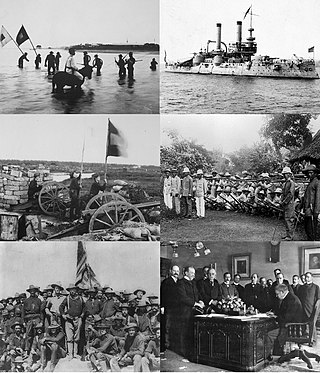
The Spanish–American War began in the aftermath of the internal explosion of USS Maine in Havana Harbor in Cuba, leading to United States intervention in the Cuban War of Independence. The war led to the United States emerging predominant in the Caribbean region, and resulted in U.S. acquisition of Puerto Rico, Guam, and the Philippines. It also led to United States involvement in the Philippine Revolution and later to the Philippine–American War.
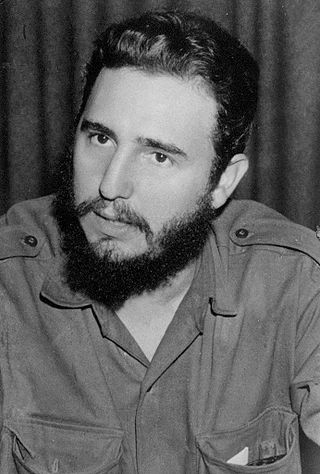
Fidel Alejandro Castro Ruz was a Cuban revolutionary and politician who was the leader of Cuba from 1959 to 2008, serving as the prime minister of Cuba from 1959 to 1976 and president from 1976 to 2008. Ideologically a Marxist–Leninist and Cuban nationalist, he also served as the first secretary of the Communist Party of Cuba from 1965 until 2011. Under his administration, Cuba became a one-party communist state; industry and business were nationalized, and socialist reforms were implemented throughout society.

Havana is the capital and largest city of Cuba. The heart of the La Habana Province, Havana is the country's main port and commercial center. The city has a population of 2.3 million inhabitants, and it spans a total of 728.26 km2 (281.18 sq mi) for the capital city side and 8,475.57 km² for the metropolitan zone – making it the largest city by area, the most populous city, and the second largest metropolitan area in the Caribbean region.

Fulgencio Batista y Zaldívar was a Cuban military officer and politician who served as the elected president of Cuba from 1940 to 1944 and as a military dictator from 1952 to 1959, until he was overthrown in the Cuban Revolution.
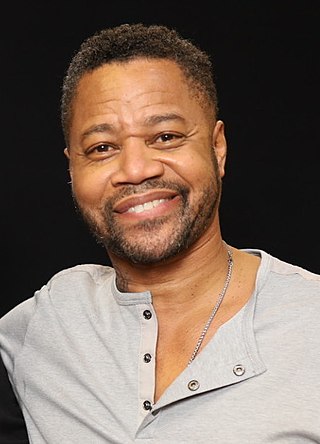
Cuba Mark Gooding Jr. is an American actor. He is the recipient of an Academy Award, a Screen Actors Guild Award, and an Emmy nomination.
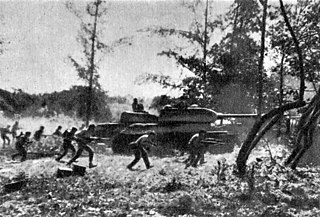
The Bay of Pigs Invasion was a failed military landing operation on the southwestern coast of Cuba in 1961 by Cuban Democratic Revolutionary Front (DRF), consisting of Cuban exiles who opposed Fidel Castro's Cuban Revolution, covertly financed and directed by the U.S. government. The operation took place at the height of the Cold War, and its failure influenced relations between Cuba, the United States, and the Soviet Union.

Raúl Modesto Castro Ruz is a Cuban retired politician and general who served as the first secretary of the Communist Party of Cuba, the most senior position in the one-party communist state, from 2011 to 2021, and President of Cuba between 2008 and 2018, succeeding his brother Fidel Castro.

The Cuban Revolution was a military and political effort to overthrow the government of Cuba between 1953 and 1959. It began after the 1952 Cuban coup d'état which placed Fulgencio Batista as head of state. After failing to contest Batista in court, Fidel Castro organized an armed attack on the Cuban military's Moncada Barracks on July 26, 1953. The rebels were arrested and while in prison formed the 26th of July Movement. After gaining amnesty the M-26-7 rebels organized an expedition from Mexico on the Granma yacht to invade Cuba. In the following years the M-26-7 rebel army would slowly defeat the Cuban army in the countryside, while its urban wing would engage in sabotage and rebel army recruitment. Over time the originally critical and ambivalent Popular Socialist Party would come to support the 26th of July Movement in late 1958. By the time the rebels were to oust Batista the revolution was being driven by the Popular Socialist Party, 26th of July Movement, and the Revolutionary Directorate of March 13.
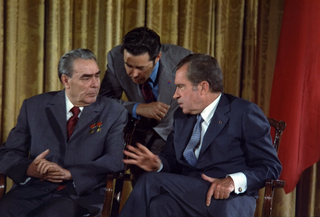
Détente is the relaxation of strained relations, especially political ones, through verbal communication. The diplomacy term originates from around 1912, when France and Germany tried unsuccessfully to reduce tensions.

Mark Cuban is an American billionaire businessman, film producer, investor, and television personality. He is the owner of the Dallas Mavericks of the National Basketball Association (NBA), co-owner of 2929 Entertainment, and one of the main "sharks" on the ABC reality television series Shark Tank.
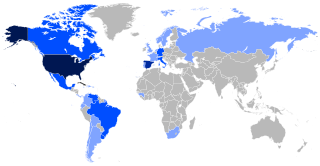
Cubans are people from Cuba or people with Cuban citizenship. Cuba is a multi-ethnic nation, home to people of different ethnic, religious and national backgrounds.

Cuba, officially the Republic of Cuba, is an island country comprising the island of Cuba, as well as Isla de la Juventud and several minor archipelagos, 4,195 islands and cays surrounding the main island belong to the country. Cuba is located where the northern Caribbean Sea, Gulf of Mexico, and Atlantic Ocean meet. Cuba is located east of the Yucatán Peninsula (Mexico), south of both the American state of Florida and the Bahamas, west of Hispaniola, and north of both Jamaica and the Cayman Islands. Havana is the largest city and capital; other major cities include Santiago de Cuba and Camagüey. The official area of the Republic of Cuba is 109,884 km2 (42,426 sq mi) but a total of 350,730 km2 (135,420 sq mi) including the exclusive economic zone. Cuba is the second-most populous country in the Caribbean after Haiti, with over 11 million inhabitants.
Christianity is the most widely professed religion in Cuba, with Catholicism being its largest denomination. A significant share of the Cuban population is either non-religious or practices folk religions.

Ernesto "Che" Guevara was an Argentine Marxist revolutionary, physician, author, guerrilla leader, diplomat, and military theorist. A major figure of the Cuban Revolution, his stylized visage has become a ubiquitous countercultural symbol of rebellion and global insignia in popular culture.
Phyllops vetus is an extinct relative of the Cuban fig-eating bat. Its remains have been found on Cuba and Isle of Pines.
Phyllops silvai, also known as Silva's fig-eating bat, is a recently extinct species of bat from western Cuba. It is a close relative of the living Cuban fig-eating bat.













